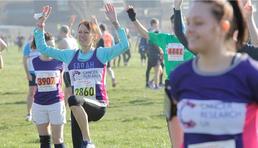Top ten most asked training questions

Your top training questions answered
Got a question about your training? Here we've answered the top ten most commonly asked questions about training for an event. If you can't find the answer you need, you can also email our professional running partners RunningWithUs at info@runningwithus.com.
I have started to notice pain building up and I am not sure whether to train through it, or rest?
Training for an event can be stressful on the body even for those who have been running for years. Listening to the warning signs early and acting upon them are important elements to getting the most out of your training. Look to get yourself an ‘MOT’ from a good local sports physio to check any signs of an impending injury. If pain levels when you run are rising beyond a 4 out of 10 then you need to rest and cut back on the training.
I am injured and I am worried I won’t be able to complete the marathon.
If you find that you do need to take a period off running do not give up hope. Book an appointment with a sports doctor or physio for an appropriate course of rehabilitation. If possible look to include less weight bearing cross training such as aqua jogging, swimming or elliptical training. These are low impact and can help recovery.
How can I minimize my chances of picking up an injury?
Stretch daily. Look to include running on grass or softer trails. Gently undulating routes are good ways to help manage any build up in soreness. Regular sports massage can be really beneficial. Take additional rest days if needed. It’s perfectly possible to run a good marathon from 3-4 runs a week so respect the role that rest days, sleep and good nutrition have in injury management.
I have missed a bit of training due to sickness, what should I do and how to play catch up?
The most important thing is to NOT try to play catch up. Staying healthy and easing back into full training is the correct approach. Don’t rush your recovery trying and run too far or too fast to make up for missed time. Your body will need to ease back into running to continue its recovery. Aim for 2 or 3 30-45 minute easy runs in your first week back. Take care with your first long run back, if you were already running 15+ miles you won’t have lost fitness from a week or so off, so don’t force the come back. The key is to gradually build your fitness back up over 2-3 weeks.
Your training plans show a longest long run of 3hrs – 3hrs 30 minutes – I am worried that I won’t have done enough.
For many runners a long run of 3hrs 15-30 minutes at a pace slower than marathon pace will mean a maximum long run of 19-20 miles. Try not to get caught up with chasing miles. Experience from our work with runners of all abilities tells us that performance is gained from a balance of training and recovery. Long runs in excess of 3 hours and 30 minutes take too long to recover from and can result in fatigue, which means hitting race day tired. A series of runs between 3h – 3h 30m, including chunks at race pace, combined with your hill running, threshold runs and perhaps a half marathon will see you performing brilliantly on race day.
How do I go about fuelling my long runs and marathons?
Our simple advice would be to take a gel on any run that is longer than 90 mins. If the run is longer than 90 mins then take a gel every 30-45 mins, starting in the first hour.
Sip water every 5k. On long runs you may also want to drink a sports drink.
I’m struggling for motivation and keep missing sessions – what should I do?
Consistency and routine are the bedrock of progressing your fitness. Regularly skipping days or even weeks of training will, in the end, lead to your race becoming a real challenge. Be organised and work to a realistic plan. If you know you can only get out 3-4 times a week then plan for that, otherwise you’ll soon lose motivation and skip training.
Here are some of our tips on how to remain motivated:
- Plan ahead – add your runs to your diary
- Make it social – run with friends or join a running club – you will find that you end up enjoying your training more
- Challenge yourself – run a local park run or a 10km once a month to monitor your progress
- Train early – set your alarm for early morning runs, the rest of the day is then your own.
Should I race a half marathon in my training?
Using races in your marathon build up can be a really useful way of checking out that you are on track and breaking up that long term marathon goal into manageable chunks. We often recommend including a couple of half marathon races. Look to run one at a fast pace and then running the other at your marathon pace.
Is there a benefit in doing other types of training as well as running or should I just focus on runs?
We are strong believers in mixing your running training with other forms of training, or cross training as its known. There are two types most runners will need to consider:
Cardio Vascular
Cardio vascular cross training that will work your heart and lungs. This can include aqua jogging, swimming, cycling, elliptical training etc. Its low impact and will be important to incorporate into your training if you feel like you’re picking up an injury. You might actually find your cross training makes you not only a fitter runner, but a stronger runner as well. If you have the time try adding in 1-2 cross training sessions a week.
Strength and Conditioning
The other type of cross training is strength and conditioning. This time we are not focused on developing your heart and lungs but on helping to keep you strong and flexible enough to cope with the rigours of training. Running specific exercises that focus on single leg strength and stability, such as one legged squats or walking lunges, are great ways to help your running. If you are not sure, find yourself a good quality local pilates class.
How fast should I run my long runs?
Runners are often surprised when we ask them to do a lot of running at a genuinely conversational pace. Running at this easy pace allows the body to get used to metabolising stored fat as a primary energy source, which is vital for marathon runners on race day. Further to this if you always train at race pace or faster then you may end up building up fatigue and underperforming on race day.
I have heard interval training is good for runners but I am not sure what it is and how to do it.
Interval training essentially refers to breaking up your running into a series of shorter, faster bursts with rest breaks. This can be a highly effective way of advancing your training but the key is to remember what distance you’re training for. We encourage runners to get used to longer efforts at a controlled discomfort or 3-4 word answer effort. If you run like this 5-10 minute spells with short 1-2 minute recovery jogs, then this will be appropriate for marathon training.
Training hub
Whether it's your first 10k or you're a seasoned marathoner, we have a training plan for you.
Nutrition guides
Our nutrition guide will help you to eat well whilst you train for your event.


